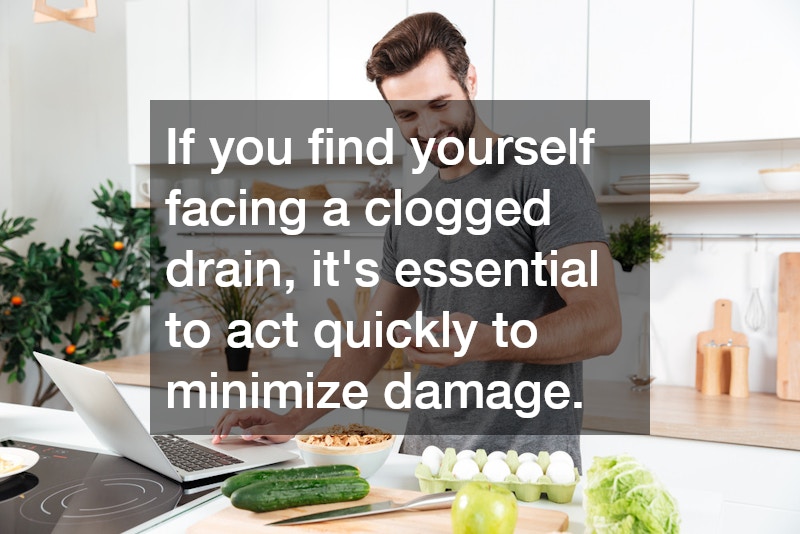
Clogged drains are one of the most common household inconveniences. They can occur in any home and often at the most inconvenient times. Understanding what causes a drain to clog is the first step in preventing it from happening. Typical causes of clogs include hair build-up, soap scum, food particles, and grease. Recognizing these causes can help you take the necessary preventive measures.
Hair is a frequent offender in bathroom drains. It can easily bind with soap residue to form solid blockages. Over time, even small amounts of hair can accumulate and create large problems. Using a drain cover can help catch hair before it goes down the drain. Regularly cleaning these covers will reduce the chances of a major clog.
In kitchen sinks, grease is the most common clogging agent. Grease hardens as it cools, sticking to the walls of your pipes and collecting debris. To avoid this issue, never pour grease directly down the drain. Instead, let it cool and dispose of it in the trash. This simple habit can prevent future headaches and plumbing expenses.
Immediate Steps to Take When Faced with a Clogged Drain
If you find yourself facing a clogged drain, it’s essential to act quickly to minimize damage. The first step is to cease all use of water in the affected area to prevent overflow and further issues. Once water use is stopped, assess the situation to understand the severity of the clog. Be careful not to use boiling water on PVC pipes, where heat could cause damage.
Many homeowners find that a plunger can be an effective tool against minor clogs. Ensure that the plunger is the right size for the drain you’re attempting to unclog. Create a solid seal and use firm, repeated pressure to dislodge the clog. If you’re dealing with a double sink, one side must be tightly plugged to maximize suction. This method can provide a quick fix without the need for harsh chemicals.
If plunging doesn’t resolve the issue, the next logical step is to use a drain snake. A drain snake can physically break down and remove a clog. These tools are readily available at hardware stores and are easy to use with some basic guidance. However, if you’re uncertain or uncomfortable using a snake, it may be beneficial to reach out to local plumbing contractors. They have the expertise and tools needed to handle more severe blockages safely and effectively.
When to Call a Professional Local Plumbing Contractor
While many clogged drains can be tackled with DIY methods, some situations demand professional intervention. Persistent clogs that recur despite repeated attempts to clear them could indicate a more serious problem within your plumbing system. Issues deeper in your plumbing might involve factors like pipe corrosion or invasive tree roots. A trained professional can better diagnose these complex problems and provide tailored solutions.
Attempting to fix severe clogs on your own might lead to further damage and more expensive repairs in the future. Local plumbing contractors possess the experience and equipment necessary to handle even the toughest clogs. They can also provide preventative maintenance advice to help avoid repeated issues. Investing in professional help can save you time and endless frustration down the line.
It’s also important to consider the cost factor. While hiring a professional might feel like an unnecessary expense, the cost of significant plumbing repairs due to exacerbated problems can far outweigh the initial investment in expert help. Local plumbing contractors often offer free consultations to assess your situation and recommend the best course of action. By choosing a trusted local professional, you benefit from quick response times and know that your issue will be addressed with efficiency and skill.
Preventive Measures to Avoid Future Clogged Drains
Once you’ve resolved a clogged drain, it’s wise to implement preventive measures to avoid future occurrences. Regular maintenance and care can significantly reduce the likelihood of clogs. Start by paying attention to what goes down your drains – avoid rinsing food scraps, coffee grounds, and other debris down your kitchen sink. Employing these habits can keep your drains clear and mitigate potential problems before they arise.
Introducing routine cleaning to your maintenance practices can further prevent clogs. Simple natural solutions, like pouring a mixture of vinegar and baking soda down your drains, can help clear minor build-up and deodorize your pipes. Regularly flushing drains with hot water also aids in the removal of soap scum and grease. These small efforts collectively contribute to a long-term health of your plumbing system.
Additionally, scheduling regular check-ups with local plumbing contractors can ensure your plumbing system remains in optimal condition. These professionals can identify and rectify potential issues before they develop into serious problems. By establishing a routine service agreement, you can keep plumbing disasters at bay and enjoy peace of mind knowing that experts are maintaining your home’s vital systems. Prevention is often the best solution to all plumbing challenges.




